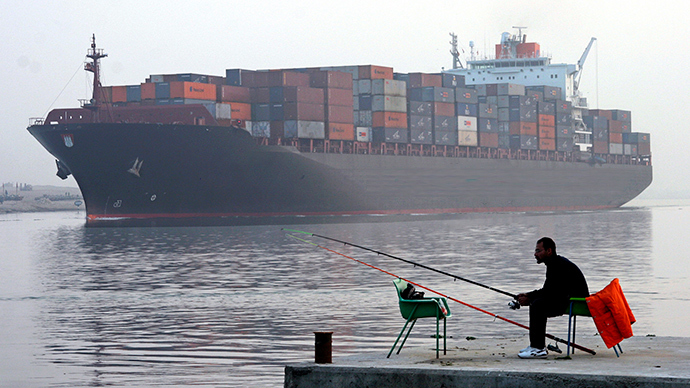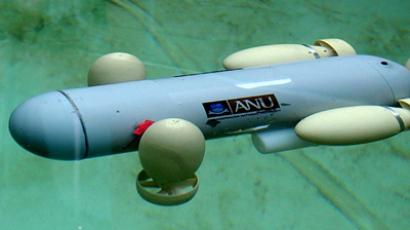Rolls-Royce believes time of drone cargo ships has come

Marine innovation engineering department at Rolls-Royce has presented a draft design of an ocean-going robo-vessel that could enter service within a decade. Experts remain highly skeptical that computers could replace human instincts anytime soon.
Rolls-Royce (RR/) Holdings Plc, which started designing autonomous cargo vessels in 2013, have presented in Bloomberg original computer design of crewless cargo ships. The vessels have a distinct difference from all modern ships: they lack any deck housing whatsoever.
"The idea of a remote-controlled ship is not new, it has been around for decades, but the difference is the technology now exists,” announced Oskar Levander, head of marine innovation engineering at Rolls-Royce, in an interview to the Financial Times last December.
The explosion in development of drones operating in all environments predetermines that robotic vehicles and vessels are going to revolutionize transportation worldwide. And for the world’s $375 billion shipping industry currently delivering 90 percent of world trade, that is going to be a hell of a challenge.
The bright outlook of saving money in commercial navigation by introducing robotic vessels keeps haunting British engineers, who want to stake a claim on being among the pioneers of drone cargo ships.
Rolls-Royce specialists realize that at the moment international regulators are not ready to embrace the idea of civil sea drones, but a journey of a thousand miles begins with a single step, so they are initiating public debate on the issue. The company is now pushing for organizing legal arrangements for the huge undertaking because without agreed international regulations on drone seafaring in place all talks about creating robotic fleet are useless: the absence of legal market would be a barrier to demand.
“There is no point us developing remote-controlled ships if there isn’t a market to sell them into,” said Levander, Rolls-Royce’s vice-president of innovation in marine engineering and technology, to Bloomberg. “We can make it happen faster technologically than we can on the regulatory side.”
“Now the technology is at the level where we can make this happen, and society is moving in this direction,” Levander said. “If we want marine to do this, now is the time to move.”
A practical step towards robotic maritime future is going to be made on local sea routes in the EU and the US, where lanes in coastal waters are operating under one jurisdiction, he predicts.
“I think it will take more than 10 years before you have all the global rules in place, but you may have a local administration that is prepared to run [robotic ships] sooner,” said Levander.
With the drone frenzy that engulfed America’s military and even internet merchandise, with Google buying robot producers and Amazon announcing drone deliveries within five years’ time unmanned maritime is inevitable, Levander believes.
“It is happening in all the other industries so it is only logical that it should happen in marine,” he said.
With computers generally increasing their roles in navigation and operations, the transition to drone ships will happen gradually, assured Levander. Container and dry-bulk carrier ships are likely to get rid of crews first, while hazardous materials such as flammable oil and liquefied natural gas will demand manned steering, because of the “perception that having people on board is safer,” he said. With time, remote-controlled ships will become even safer to operate than manned ones today, assured the Rolls-Royce expert.
The EU is currently funding 3.5-million-euro Maritime Unmanned Navigation through Intelligence in Networks project (MUNIN), similar to that of a plane’s autopilot, when one crew sets a course for vessel and leaves the ship, whereas another crew meets the vessel overseas close to the destination port and sails it to the pier.
Drone skeptics
The economies of the robotic cargo vessels are obvious: no crew costs (average $3,299 a day, or about 44 percent of total operating expenses for a large freighter, according to Moore Stephens LLP, quoted by Bloomberg), no life-support system expenses, more space for cargo in absence of a bridge, control cabin and staterooms. Apart from giving additional space for cargo, such ships would use 15 percent less fuel, according to Bloomberg.
But potential investment needed to make ships steer themselves to destination might be high enough to consider the idea financially unattractive.
“I don’t think personally that there’s a huge cost-benefit in unmanned ships today, but technologically it’s possible,” said Tor Svensen, chief executive officer of maritime for DNV GL, the largest company certifying vessels for safety standards, in early February. “My prediction is that it’s not coming in the foreseeable future.”
The UK-based International Association of Classification Societies so far hasn’t developed unified rules for unmanned vessels operation.
“Can you imagine what it would be like with an unmanned vessel with cargo on board trading on the open seas? You get in enough trouble with crew on board,” the organization’s secretary Derek Hodgson told Bloomberg in early January. “There are an enormous number of hoops for it to go through before it even got onto the drawing board.”
The London-based International Chamber of Shipping confirmed that drone ships are illegal under current international conventions. The chamber, representing over 80 percent of the global fleet, does not considering the issue serious at this point, shared spokesman Simon Bennett earlier in February.
“I’m not very much of a fan and think this is a long way off,” said Peter Hinchliffe, secretary-general of the International Chamber of Shipping.
The International Maritime Organization (IMO), the UN agency that has overseen global shipping for almost 70 years, so far hasn’t received any proposals on unmanned or remote-controlled ships, spokeswoman Natasha Brown confirmed in an email. The IMO’s regulations apply to any vessel exceeding 500 gross tons, battleships and fishing boats excluded.
Without complying with IMO regulations, no robotic ships would be considered seaworthy and eligible for insurance, stressed Andrew Bardot, secretary and executive officer of the London-based International Group of P&I Clubs, representing 90 percent of the world fleet.
Besides legal obstacles, there is a human factor as well as there are well over a million seafarers worldwide.
The International Transport Workers’ Federation, representing about 600,000 world’s skilled maritime specialists strictly oppose the innovation, warning of the “dangers posed to the environment by unmanned vessels.”
“It cannot and will never replace the eyes, ears and thought processes of professional seafarers,” maintained Dave Heindel, chairman of the ITF’s seafarers’ section in London, in an emailed statement.
While Rolls-Royce maintains that unmanned ships are going to be more resistant to pirate attacks because there will be “no crew to take hostage,” others believe the drone ships will see piracy flourish, because any remotely-controlled mechanism could be hijacked or manipulated, just like the American spy drone RQ-170 Sentinel safely grounded by Iranian military in 2011.
“Take the crews off a ship, and I will become a pirate,” wrote user rubadubdoobie in comments on the Bloomberg website.
“There are billions of dollars aboard nearly all of these ships. An unguarded ship, few security measures, billions of dollars as a sitting duck.... only a fool would NOT become a pirate, if there was literally no one to stop you or even ID you,” wrote rubadubdoobie, adding that “These ships would be an unguarded ATM sitting in the middle of the ocean.”














